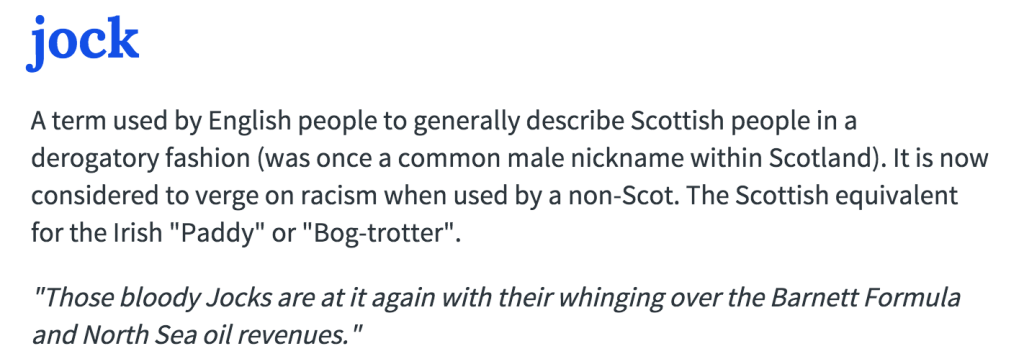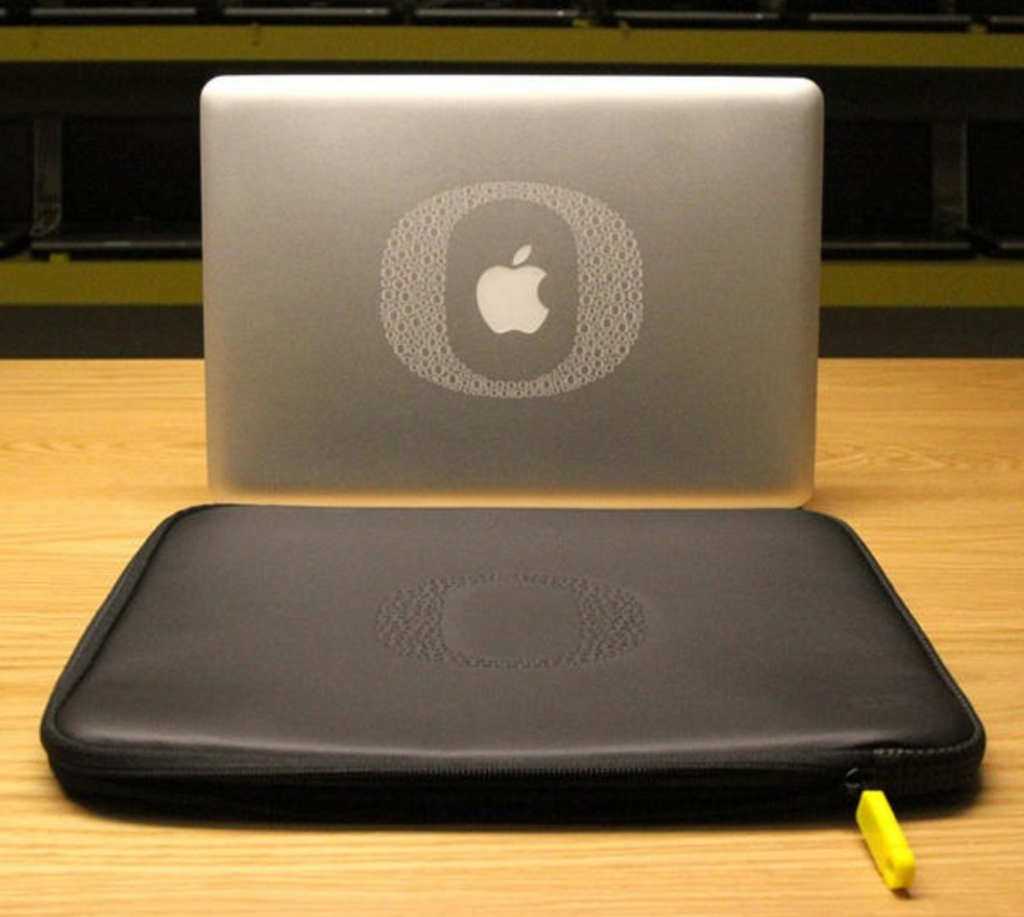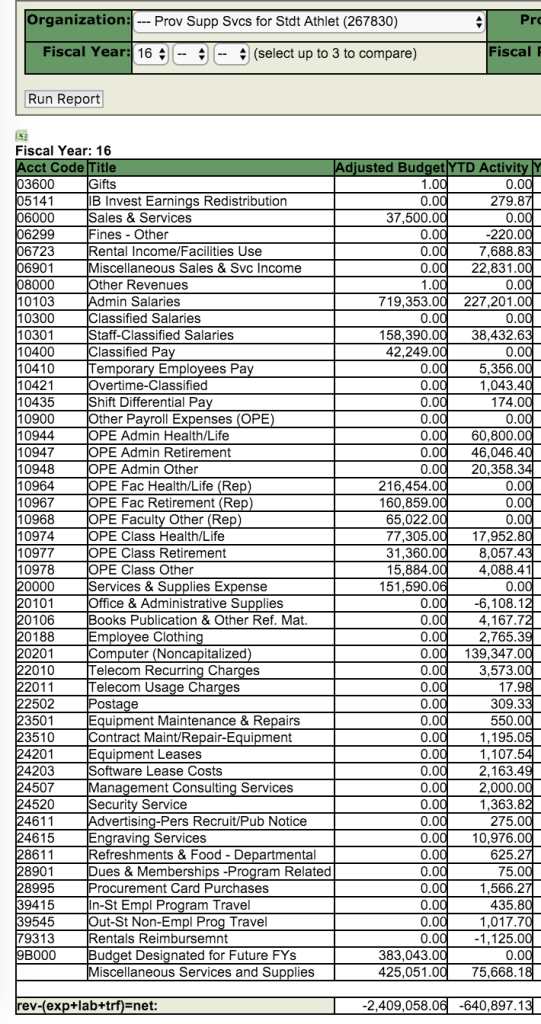Update: Some brief notes from the meeting today: The PAGIA has not yet met this year. Gleason believes Kim Sheehan (Advertising) is still the chair. Gleason gives an interesting report on some of the topics that he and the PAC-12 and FBS conferences have and will be voting on (including many of obvious academic importance). All apparently done without faculty input. This was followed by a full and frank discussion focused on the athletic department’s unwillingness to meet with the IAC, and the Jaqua Center’s unwillingness to share data. As usual the student members did a great job with questions.
Gleason brought up the use of the allegedly derogatory phrase “Jock Box”, which originally appeared in print in the New York Times, in their 2010 “University of Nike” story. It turns out Gleason has a point, of sorts, according to the well know urban dictionary website:
One of the student representatives then explained to Gleason that the phrase reflected legitimate concerns by non-athletic students over the fact they are not allowed to use the box, but have to pay for it. Links to Greg Bolt’s stories about this are here. This year the subsidy is $2.4M, including $11K to engrave the $140K worth of Macbooks that the athletes get:
Why do UO’s regular students have to pay for all this out of their tuition? Why does Gleason expect them to do so happily?
10/27/2015: Yes, of course it’s a public meeting.

Hopes are high that Senate Intercollegiate Athletics Committee Chair Andy Karduna (Human Phys) will be able to successfully follow up on the excellent work that Kurt Krueger (Printing) did as chair last year, in the aftermath of the basketball rape allegation cover-up. The less said about the disastrous leadership of 2013-14 chair Rob Illig (Law) the better, although I notice Krueger has a brief history report on the agenda.
The highlight of the meeting will no doubt be the report from UO’s new Faculty Athletics Representative, Tim Gleason (Journalism).
UO’s previous FAR, Jim O’Fallon (Law), was also on the NCAA Infractions Committee, where he contributed to the ruin of many a young student-athlete. Here’s his committee’s report on UConn basketball player Nate Miles:
As stated in the committee’s public infractions report, this case centers on the “extraordinary steps” taken by the university to recruit a top prospective student-athlete to its men’s basketball program. The director of athletics stated it was the “most intense” he has ever seen the head coach about the recruitment of a prospective student-athlete. The committee found that in his “zeal” to get the prospect admitted to the university and eligible to compete, the head coach allowed a booster, who was a certified agent by the National Basketball Association, to be involved in the recruitment process. Further, the committee found that the head coach “overlooked indications” that this booster might be breaking NCAA rules. Specifically, the booster provided the prospect with impermissible inducements, including the payment of at least a portion of the expenses for the young man’s foot surgery; …
The members of the Committee on Infractions who reviewed this case include Dr. Dennis Thomas, the commissioner of the Mid-Eastern Athletic Conference and chair of the Committee on Infractions. Other members are Britton Banowsky, commissioner of Conference USA; John S. Black, attorney; Eleanor Myers, faculty athletics representative and law professor at Temple University; Josephine (Jo) R. Potuto, the Richard H. Larson Professor of Constitutional Law at the University of Nebraska College of Law; Roscoe C. Howard, Jr., attorney; and James O’Fallon, law professor and faculty athletics representative for University of Oregon.
That’s right, some booster paid for an athlete’s foot-surgery, so the NCAA ruined his life. The athlete’s life, that is. There were some claims that the NCAA’s Infractions Committee violated HIPPA in this investigation, but I don’t know what came of that. The NYT reported in 2011 on the consequences of this ruling for “the prospect”:
The former University of Connecticut basketball recruit Nate Miles is effectively homeless. He moves from friend’s couch to friend’s couch, still recovering from a violent assault that left him with a stab wound and a punctured lung and a monthlong stay in the hospital.
Miles, 23, has obligations to go with his troubles, two sons from different mothers, and no great confidence in where his next meal is coming from. A life playing basketball, the sport he once planned to make a grand career of, seems unlikely. He was fired from the Premiere Basketball League’s Dayton, Ohio, team, and he now says he cannot afford to play at a local recreation center because he lacks the $10 fee.
… “I don’t feel like it’s fair, but it’s life; life isn’t fair,” Miles said.
 |
|
| NCAA enforcer and UO FAR Jim O’Fallon | NCAA player Nate Miles |
But life is more than fair for the FAR. We paid O’Fallon $97K to do this job, half-time:
And now we’re paying Tim Gleason $100K:
This money – and all the expenses of the FAR office – come out of UO’s academic budget. So the IAC should expect a pretty thorough report from our faculty colleague Tim Gleason, on what he has been doing, and plans to do, to ensure that the Duck’s revenue student-athletes get something besides an A+ in their “Art of the Athlete” class, in return for all the money they bring in for their coaches.
IAC Agenda:
Location: 109 Friendly
Day: Wednesday, October 28, 2015
Time: 1-2 pm
Tentative Schedule
1:00 Welcome and introductions: Chair
1:10 A Brief History: Kurt Krueger, Immediate Past Chair
1:20 Faculty Athletic Representative (FAR) report/comments: Tim Gleason
1:30 Role of IAC Executive Committee: Chair
1:35 Discussion of the charge of the committee: Chair
1:45 Open Discussion – member questions, concerns, priorities, agenda items, etc.
1:55 Scheduling of future meetings






I’m guessing Gleason said the academic side has to pay for it so they have oversight, because when the athletic side runs it, North Carolina happens.
Close?
No, Bean used to say that though. Until we started asking just what that academic oversight consisted of, besides Lorraine Davis.
Would you rather the athletic department have autonomous financial control over the academic assistance provided to student athletes?
This is a serious question. I’m no economist, but I have to think the risk multiplier would be through the roof.
Are the two extremes the only possibilities? 1) Academic side pays for operation of the center and has oversight over the staff there. 2) Athletics has autonomous financial control over the academic assistance. I can imagine other possibilities, such as everything is exactly as it is now but the Provost or President moves money from athletics back the general fund at the end of the year. Research cores had gotten funds moved out for mysterious support such as accounting and have just had to budget that as an expense. And yet, despite providing the money, have no say over staffing or operations of those groups. So why can’t athletics kick in all or some of the cost?
Because if athletics kicked in some of the cost that would cost athletics. And that doesn’t happen at UO.
If athletics kicks in money, it will expect to have a say or a modicum of control relative to said amount. Academic side needs autonomous control of purse strings for autonomous oversight. It really is an all or nothing issue.
From a 2007 Times article:
Another issue is oversight: The educational support centers often report to the athletic director, who has an interest in keeping athletes eligible to compete, instead of to the academic leadership.
“I think that the people who work in it should be working for the provost,” said Jim Delany, the commissioner of the Big Ten Conference.
http://www.nytimes.com/2006/11/04/sports/ncaafootball/04ncaa.html?pagewanted=all&_r=0
UO’s academic side has no control over Duck athlete admissions or advising, despite the $2.4M we pay. I’ve posted a lot about our lack of control in the past, and there’s plenty of disturbing new stuff I could post, if I thought it would make a damn bit of difference.
It won’t. Best case is we play along and decrease the subsidy, or at least don’t let them increase it.
Yodeler, you say that if athletics kicks in money, it will expect to have control, and then link to an article where the centers report to the athletic director.
But that expectation is just an expectation. I already pointed out that research cores send money to central units without any ability, or expectation, of control over how that money is spent. Cores have been convinced that this is normal. The same could be done to athletics with appropriate leadership.
I perhaps wonder if these Macbooks only athletes are getting at the cost of non-athletes is a violation of any NCAA rules about athletes receiving gratuities? Were this just athletics using money donated to the program to buy these laptops then it would be one thing. Since the money is being supplied by non-athletes who are being forced to pay it then aren’t only athletes receiving a benefit? $11,000 to engrave them is ridiculous. You can purchase an engraving machine for around $1,200. Though I suppose athletics would have to have a coach, assistant coach, assistant to the assistant coach, 3 trainers, an administrative aide, an equipment manager and a new building paid for by non-athlete students in which to house the new engraver and the staff to run engraving operations. If they do over 50 engravings does this qualify said coach for a bonus of some sort? Surely it must.
I learned that “jock” is a derogatory term at this meeting. Apparently many student athletes are hurt when we refer to Jacqua as the “jock box”. As I try not to unnecessarily offend, I will discontinue my use of the term, though as one of the student reps on the IAC said, there are reasons why the campus community may have a derogatory term for the Jacqua building.
All in all it was an informative meeting, though I’m still not sure exactly what the IAC is supposed to do, and how we will do it without interaction from athletics. Hopefully there will be some pressure from the new administration to get them back at the table so we can talk about substantive issues. I’m not optimistic, however, that a ginormous committee can get anything real done in a total of 8 (7 now) one hour meetings over the course of an academic year.
Doesn’t the term “jock” come from the jockstrap that many male athletes wear? I believe this term derived from jockey strap that helped protect certain male anatomy during horse races. It may be derogatory, but it does not involve the Scots.
Thanks, Ex. Do you think it’s a derogatory term? Maybe I should run a poll on this question?
Wikipedia provides the female equivalent: jillstrap. The “jills and jocks box”?
https://en.wikipedia.org/wiki/Jockstrap
And this from that wiki:
The jockstrap was invented in 1874 by C. F. Bennett of a Chicago sporting goods company, Sharp & Smith, to provide comfort and support for bicycle jockeys working the cobblestone streets of Boston. In 1897 Bennett’s newly formed Bike Web Company patented and began mass-producing the Bike Jockey Strap. The Bike Web Company later became known as the Bike Company. Today, Bike is still the market leader in jockstrap sales.
Fascinating. We still need some data on whether or not it is pejorative. Surely some linguistic dweeb is willing to look into that for UO M?
We should consider a gender neutral version for the upper floors of PLC.